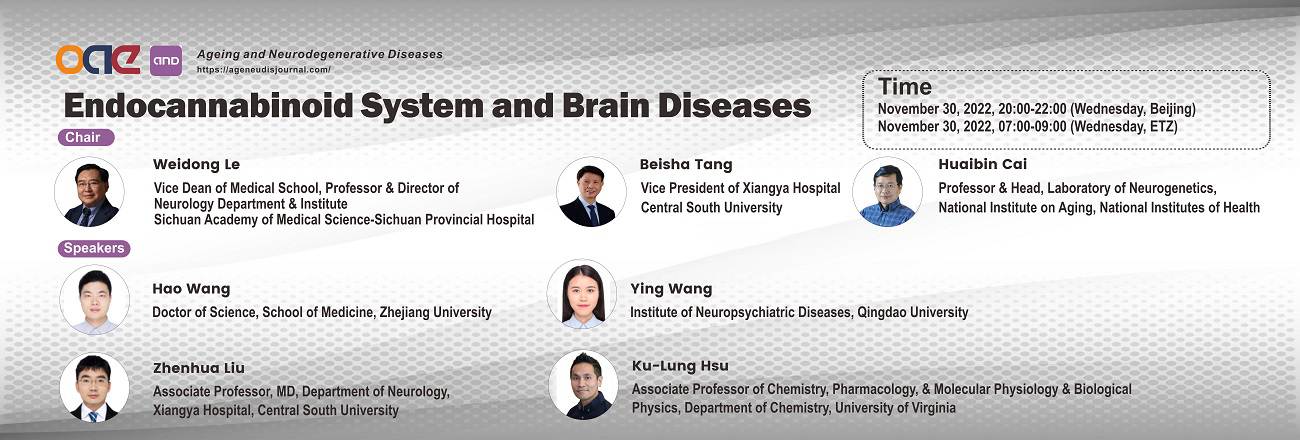Contents
Chair(s)
Weidong Le
Editor-in-Chief
National Distinguished Expert, Professor of Neurology, Doctoral Supervisor
National Distinguished Expert, Professor of Neurology, Doctoral Supervisor
Prof. Le is the Director of the Academic Committee of School of Medicine of University of Electronic Science and Technology of China, Director of Neurology Department & Institute in Sichuan Academy of Medical Science-Sichuan Provincial Hospital. He also works as Tenured Professor & Head of the top clinical discipline in Dalian Medical University.
He was a Professor of Neurology and Director of the Parkinson's Disease Research Center at Baylor College of Medicine. He also worked as the Director of the Institute of Neurology at Shanghai Jiaotong University School of Medicine and the Executive Chairman of the Biomedical Institute of Shanghai Ruijin Hospital.
Prof. Le is interested in researching the pathogenesis, biomarkers, and targeted therapy of neurodegenerative diseases. He has published more than 300 papers in internationally critical academic journals, such as Nature Genetics, Science, PNAS, Autophagy, Brain, JAMA, Lancet Neurology, etc. The papers have been cited over 20,000 times, and he has been chosen into the list of Highly Cited Chinese Researchers in Neuroscience by Elsevier for eight years. Prof. Le held 3 Key Programs and 5 General Programs of the National Natural Science Foundation of China, held/participated in 4 Key Projects of Chinese National Programs for Fundamental Research and Development (973 programs) and Chinese National Programs for High Technology Research and Development (863 programs).
He was a Professor of Neurology and Director of the Parkinson's Disease Research Center at Baylor College of Medicine. He also worked as the Director of the Institute of Neurology at Shanghai Jiaotong University School of Medicine and the Executive Chairman of the Biomedical Institute of Shanghai Ruijin Hospital.
Prof. Le is interested in researching the pathogenesis, biomarkers, and targeted therapy of neurodegenerative diseases. He has published more than 300 papers in internationally critical academic journals, such as Nature Genetics, Science, PNAS, Autophagy, Brain, JAMA, Lancet Neurology, etc. The papers have been cited over 20,000 times, and he has been chosen into the list of Highly Cited Chinese Researchers in Neuroscience by Elsevier for eight years. Prof. Le held 3 Key Programs and 5 General Programs of the National Natural Science Foundation of China, held/participated in 4 Key Projects of Chinese National Programs for Fundamental Research and Development (973 programs) and Chinese National Programs for High Technology Research and Development (863 programs).
Beisha Tang
Vice President of Xiangya Hospital, Central South University
Prof. Tang, M.D., Ph.D., is a senior consultant, professor, and doctoral supervisor of Neurology at Xiangya Hospital, Central South University, receiver of State Council Special Allowance. He was awarded the title "Young Expert with Outstanding Contribution" by the Chinese Ministry of Health and is currently a vice president of Xiangya Hospital.
He has been engaged in clinical and basic research on neurodegenerative diseases and neurogenetics (spinocerebellar ataxia, Parkinson's disease, Alzheimer's disease, motor neuron disease). He has established genetic diagnosis and molecular diagnostic technology platforms for more than 30 kinds of neurodegenerative diseases and neurogenetics in the Chinese Han population, including spinocerebellar ataxia, Parkinson's disease, Alzheimer's disease, amyotrophic lateral sclerosis, frontotemporal dementia, Charcot-Marie-Tooth disease, hereditary spastic paraplegia and epilepsy, accomplished genetic diagnosis for more than 5000 pedigrees, identified 60 cases of novel causative mutations and discovered that SCA3/MJD genotype is the predominant subtype in Chinese Han SCA patents. In addition, he has successfully cloned novel causative genes for SCA genotype (SCA35)-TGM6, PKD-PRRT2, and CMT genotype (CMT2L)-HSP22 by the "LEC" strategy.
He has been engaged in clinical and basic research on neurodegenerative diseases and neurogenetics (spinocerebellar ataxia, Parkinson's disease, Alzheimer's disease, motor neuron disease). He has established genetic diagnosis and molecular diagnostic technology platforms for more than 30 kinds of neurodegenerative diseases and neurogenetics in the Chinese Han population, including spinocerebellar ataxia, Parkinson's disease, Alzheimer's disease, amyotrophic lateral sclerosis, frontotemporal dementia, Charcot-Marie-Tooth disease, hereditary spastic paraplegia and epilepsy, accomplished genetic diagnosis for more than 5000 pedigrees, identified 60 cases of novel causative mutations and discovered that SCA3/MJD genotype is the predominant subtype in Chinese Han SCA patents. In addition, he has successfully cloned novel causative genes for SCA genotype (SCA35)-TGM6, PKD-PRRT2, and CMT genotype (CMT2L)-HSP22 by the "LEC" strategy.
Huaibin Cai
Professor & Head, Laboratory of Neurogenetics, National Institute on Aging, National Institutes of Health
Prof. Cai received his B.S. in Biology in 1991 from Peking University, Beijing, China, and his Ph.D. in Neuroscience in 1999 from the Johns Hopkins University School of Medicine. He joined the NIA Laboratory of Neurogenetics as an Investigator in 2003 and was promoted to Senior Investigator in 2011 to head the Transgenics Section.
He is keen to develop and utilize new optogenetics tools to map the basal ganglion DA circuits that are selectively affected in PD. In this regard, he is particularly interested in establishing the deep brain imaging system to study the neuron activity of basal ganglion DA circuits in PD-related mouse models. This new brain imaging approach may allow for early detection of disease-related preclinical alterations of DA transmission and quick testing of the efficacy of potential therapeutic interventions. This highly integrated interdisciplinary research strategy may bring new insights into the pathogenic mechanisms of PD and ALS while also providing new biomarkers and therapeutic targets for diagnosing and treating these devastating illnesses.
He is keen to develop and utilize new optogenetics tools to map the basal ganglion DA circuits that are selectively affected in PD. In this regard, he is particularly interested in establishing the deep brain imaging system to study the neuron activity of basal ganglion DA circuits in PD-related mouse models. This new brain imaging approach may allow for early detection of disease-related preclinical alterations of DA transmission and quick testing of the efficacy of potential therapeutic interventions. This highly integrated interdisciplinary research strategy may bring new insights into the pathogenic mechanisms of PD and ALS while also providing new biomarkers and therapeutic targets for diagnosing and treating these devastating illnesses.
Speaker(s)
Hao Wang
Doctor of Science, School of Medicine, Zhejiang University
Topic: Cannabinoids and Emotions
Topic: Cannabinoids and Emotions
Dr. Wang is a distinguished researcher at the School of Medicine of Zhejiang University and an associate researcher at the Affiliated Mental Health Center. As the project leader, he has presided over four national and provincial (ministry) scientific research projects, including the Youth Talent Promotion Project of the China Association for Science and Technology, the National Nature Youth Foundation, the particular support project of the China Postdoctoral Foundation, and the surface project. As the project's backbone, he is researching the primary task of "Brain Science and similar brain Research" of the Ministry of Science and Technology. He has won Zhang Xiangtong Outstanding Graduate Thesis Award in Neuroscience, FENS Travel Award, Lin Baixin High Technology Award, and so on. Significant research achievements have been made in the neural circuitry mechanism of sensation and emotion. For example, the regulatory agencies of small albumin-positive neurons in the thalamic reticular nucleus and undefined zone in fear emotion and pain-like behavior have been discovered successively. Representative papers are published as the first author in Nature Neuroscience, Neuron, the British Journal of Pharmacology, and other internationally renowned journals.
Ying Wang
Institute of Neuropsychiatric Diseases, Qingdao University
Topic: Cannabinoid Transmission in the BLA-vHPC Circuit Modulates Anxiety-like Behavior
Topic: Cannabinoid Transmission in the BLA-vHPC Circuit Modulates Anxiety-like Behavior
Dr. Wang graduated from Zhejiang University and joined the Institute of Neuropsychiatric Diseases of Qingdao University in 2020. Her research focuses on the mechanism of endocannabinoid regulation of brain function and disease and the pathogenesis of epilepsy. As the first author and corresponding author in published papers in Biological Psychiatry, CNS Neuroscience & Therapeutics, Neurobiology of Disease, and other journals, and have been recommended by F1000. In addition, she has won the "Travel Awards" of the Japanese Neurological Society and the Academic Exchange Awards of the National Neuropharmacological Society.
Zhenhua Liu
Associate Professor, MD, Department of Neurology, Xiangya Hospital, Central South University
Topic: Deficiency in Endocannabinoid Synthase DAGLB Contributes to Parkinson’s Disease and Dopaminergic Neuron Dysfunction
Topic: Deficiency in Endocannabinoid Synthase DAGLB Contributes to Parkinson’s Disease and Dopaminergic Neuron Dysfunction
Dr. Liu focuses on the clinical and basic research of Parkinson's disease. Presided over 1 National Natural Science Foundation project and two local projects and participated in 1 national critical research and development program; As the corresponding author or the first author, he has published 20 SCI papers in authoritative international journals such as Nature Communications, Acta Neuropathologia, and Movement Disorders. He has been awarded two patents and published two articles in the journal Frontiers in Aging Neuroscience. He won the Outstanding Doctoral Dissertation of Hunan Province, Top Ten Youth of Xiangya Hospital of Central South University, and Outstanding Youth Post Worker.
Ku-Lung Hsu
Associate Professor of Chemistry, Pharmacology, & Molecular Physiology & Biological Physics, Department of Chemistry, University of Virginia
Topic: Exploring the Therapeutic Potential of Endocannabinoid Biosynthetic Enzymes
Topic: Exploring the Therapeutic Potential of Endocannabinoid Biosynthetic Enzymes
Dr. Hsu's research program applies the principles of chemistry and chemical biology to study fundamental protein biology. A particular emphasis is placed on proteins involved in the metabolism of fats (i.e., lipids) because lipids are necessary chemical signals for essential communication in biology and historically have served as valuable targets for medicine. The Hsu lab pursues innovations in covalent chemistry, chemical proteomics, and metabolomics to probe lipid molecules and pathways in living systems with the long-term goal of devising new pharmacological strategies for immunology and cancer biology.
<h3 id="<em>AND</em> Seminar Ⅴ" class="webinar-header "><em>AND</em> Seminar Ⅴ
AND Seminar Ⅴ: Endocannabinoid System and Brain Diseases
- Time (Beijing, UTC +8)
- Chairs/Speakers
- Topic
- 20:00-20:10
- Prof. Weidong Le
- Welcome remarks and introduction of other Chairs and all Speakers
- 20:10-20:40
- Dr. Hao Wang
- Cannabinoids and Emotions
- 20:40-21:10
- Dr. Ying Wang
- Cannabinoid Transmission in the BLA-vHPC Circuit Modulates Anxiety-like Behavior
- 21:10-21:40
- Dr. Zhenhua Liu
- Deficiency in Endocannabinoid Synthase DAGLB Contributes to Parkinson's Disease and Dopaminergic Neuron Dysfunction
- 21:40-22:10
- Dr. Ku-Lung Hsu
- Exploring the Therapeutic Potential of Endocannabinoid Biosynthetic Enzymes
- 22:20-22:20
- All
- Q&A Session







